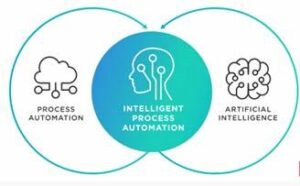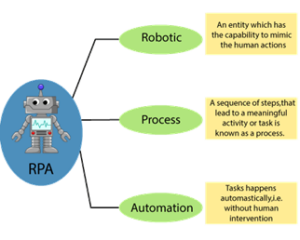IPA Vs RPA
With the digital revolution in full swing, and companies striving to become more resilient than ever before, automation is gaining momentum. To have successful automation, businesses are turning to various automation technologies like Robotic Process Automation (RPA), Intelligent Process Automation (IPA), Artificial Intelligence (AI) and so on. As a lot of comparisons have been drawn between RPA and IPA, businesses are confused on which to implement for their needs.. Here we discuss the key differences between RPA and IPA.
a. What is IPA? What IPA can do?
Intelligent process automation (IPA) is a combination of technologies used to manage and automate digital processes. IPA should increase operational efficiency, worker performance and response efficiency to customers. They should also reduce operational risk, with the goal of creating an effective operations environment.

Intelligent Process Automation (IPA) can do following things:
- Reduce your business costs.
- Save time for more important tasks.
- Avoid the risk of human error.
- Ensure traceability for analytics and audits.
- Reconcile data from various systems.
- Improve service times for clients.
- Increase end customer satisfaction.
b. What is RPA? What RPA can do?
Robotic process automation (RPA) is the use of computer software ‘robots’ to handle repetitive, rule-based digital tasks such as filling in the same information in multiple places, re-entering data, or copying and pasting.

Robotic process automation (RPA) is a software technology that makes it easy to build, deploy, and manage software robots that emulate human actions interacting with digital systems and software.
c. Key Differences
RPA vs IPA:
The difference between Robotic Process Automation and Intelligent Process Automation is that RPA is a component of IPA rather than an alternative to it. RPA is used to perform repetitive tasks with minimal variation whereas IPA (RPA + AI) is used to tackle more complex end-to-end processes.
RPA is rules-based and applies rules stipulated by humans to perform a task, for example, sending an automatic reply to an email. IPA, meanwhile, incorporates AI technologies such as machine learning and so it can perform tasks that require judgement and analysis (a loan approval is a good example), without the need for human intervention. Plus, IPA is capable of handling exceptions and continuously learns from patterns in data to improve performance.
Additionally, RPA can only deal with structured data whereas IPA can handle both structured and unstructured data.
Although RPA alone can do wonders for productivity and cutting costs in a short timeframe, IPA’s extended capabilities provide insights into process improvement opportunities across the enterprise enabling you to transform the way you work for long-term success.
d. What is suitable for your business?
Both are suitable. Preferable is RPA where we are the key partners of Ui Path & Automation Anywhere RPA tools.
About the author
Suman Mahapatra is working as Delivery Manager- RPA for DynPro and has overall 17 years of experience spanned across RPA, Testing, Software Development and Business operations. He has been instrumental in team management and delivering RPA projects in ERU, Healthcare, Banking, Media sectors across US, UK and Australia. You can reach out to him at suman.mahapatra@us.dynpro.com
